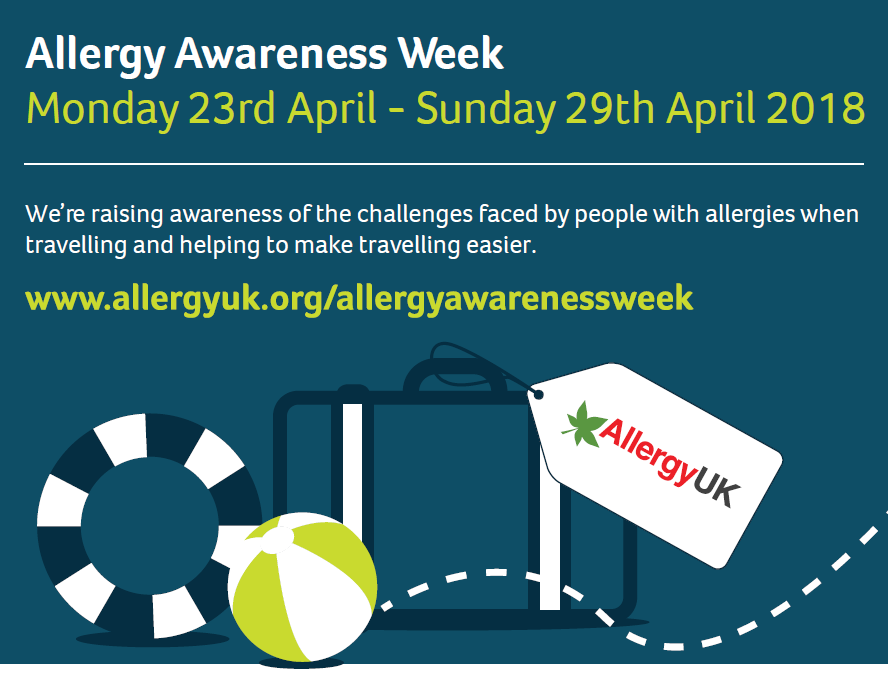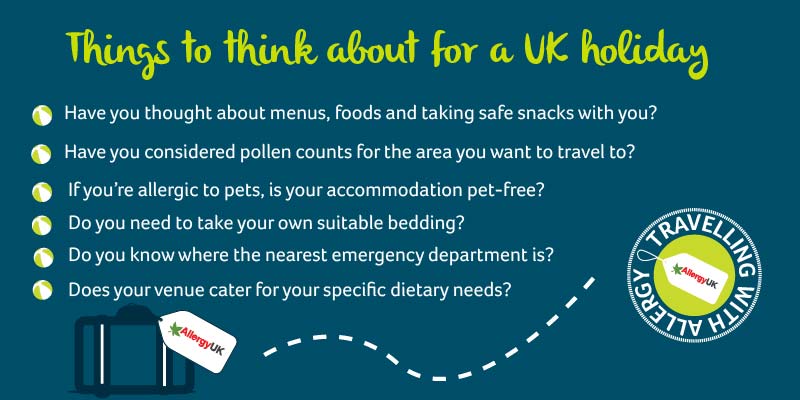
Wimbledon 2020 Cancelled
It is almost that time of the year when people would go watch a sporting

The Allergy Awareness Week annual campaign by AllergyUK aims to raise awareness about allergies and what it means to live with them. This campaign started on 23rd April and will run until 29th April. This year, the awareness week focuses on travelling with allergies and the issues that can be avoided so that people who suffer from allergies can travel safer. AllergyUK has already posted many tips on the topic, and you can learn a lot more from their site every day, including the updated results early of their flying with allergy survey.
It’s not easy to travel safely or comfortably when you or a loved one has allergies. At home, allergies don’t seem to be such a pain. You have already worked at setting up everything you need. You have educated the people around you so that they know the routine and what they need to do in case anything goes wrong. While you travel, you don’t have the benefit of these systems and networks.
From the time that you get on a plane to when you enter that new environment and stay in unfamiliar lodgings, you are in danger of being exposed to allergy triggers. You will face many different challenges. It’s important that you are aware of them, and work to overcome them before you take your holiday so that you can avoid any untoward incidents – some of which could prove quite risky or even fatal.
Planning to travel abroad already involves so many different things to prepare for. Travelling with allergies, however, makes your to-do list so much longer. When you or someone you are responsible for has allergies, you must consider the following carefully when booking a holiday in another country.
 It’s easy to tell waitstaff at restaurants about allergies in your hometown. When you travel to a foreign country, and even when you’re on a flight with foreign staff, it may not be so easy. A language barrier can exist and make communication a difficult challenge. With serious allergies, this barrier can put you in danger. Prepare to effectively communicate the needs of someone with allergies, especially when it involves dangerous food allergies. AllergyUK suggests using pre-printed Translation Cards that are easy to carry around and present whenever you need to communicate allergy restrictions. These cards do away with the language barrier so that it’s easy for you to stay safe without having to learn the language or risk making critical mistakes if you’re not fluent.
It’s easy to tell waitstaff at restaurants about allergies in your hometown. When you travel to a foreign country, and even when you’re on a flight with foreign staff, it may not be so easy. A language barrier can exist and make communication a difficult challenge. With serious allergies, this barrier can put you in danger. Prepare to effectively communicate the needs of someone with allergies, especially when it involves dangerous food allergies. AllergyUK suggests using pre-printed Translation Cards that are easy to carry around and present whenever you need to communicate allergy restrictions. These cards do away with the language barrier so that it’s easy for you to stay safe without having to learn the language or risk making critical mistakes if you’re not fluent.
Each airline has its own policies on how they manage food allergies. Because these policies can be different, you must learn which specific policies your airline of choice maintains. You also need to confirm any restrictions with them before booking a flight, and inform them by recognized channels well in advance of the flight date. This keeps both you and your airline fully informed about any foods regularly served that contain allergens or any other possible triggers.
Moreover, be sure to remind the airline staff about your food allergies every chance you get. Tell them when you check in for the flight, when you board, and whenever any type of food is offered to you.
 Prepare a backup supply of snacks and simple meal substitutes that you can eat In case anything goes wrong with food preparations on the flight or at your destination. For any food that you will carry into a foreign country, there are additional preparations. Check on any quarantine laws that apply to food brought in since that country may have strict laws. If your food is restricted, you could find yourself in trouble – at the very least, without anything safe to eat.
Prepare a backup supply of snacks and simple meal substitutes that you can eat In case anything goes wrong with food preparations on the flight or at your destination. For any food that you will carry into a foreign country, there are additional preparations. Check on any quarantine laws that apply to food brought in since that country may have strict laws. If your food is restricted, you could find yourself in trouble – at the very least, without anything safe to eat.
If you have contact allergies, always clean your surroundings and wash your hands to avoid contamination. Wipe down your plane seat and tray table with antibacterial wipes and wash again before eating. Avoid putting your fingers in your mouth. If you’re travelling with a small child with these types of allergies, wipe down anything that they are likely to touch, and frequently wipe their hands. The same applies as well for hotel rooms and any other places that you visit at your destination. To be safe from touching things you can’t easily wipe down, bring along your own hypoallergenic pillow and beddings, or at least a hypoallergenic pillow case. This will help you avoid triggers that you can’t clean off, and more importantly, avoid triggers that you may not even know can cause a reaction.
Always have a copy of your Allergy Action plan on your person wherever you go. This ensures that anyone assisting you or providing treatment in case of a bad reaction can refer to it for guidance.
 Find out if you can carry an adequate supply of allergy medications with you on the plane and to your destination, or confirm that you can purchase what you need when you get there. Again, airlines and countries will have different regulations, so find out definitively. Otherwise, you could find yourself without your vital medications, whether maintenance or preventive.
Find out if you can carry an adequate supply of allergy medications with you on the plane and to your destination, or confirm that you can purchase what you need when you get there. Again, airlines and countries will have different regulations, so find out definitively. Otherwise, you could find yourself without your vital medications, whether maintenance or preventive.
One piece of good news is that the 100ml limit that is placed on hand-carried liquids does not apply to medications. To facilitate the process, however, prepare a copy of your prescription or a letter from your doctor that explains why you need to have this medication on hand. Then you should be able to carry your needed antihistamine syrups and the like onto the plane Prepare the same documentary proof for adrenaline auto-injector devices (AAI) or any other medications that you carry with you. You may be asked to show these at your destination.
 Before booking a flight, do your research on each area that you will visit. Take particular notice of places where you can get access to medical treatment. Jot them down so you can easily locate them in case you need medical attention. Learn how to contact these emergency care centres, and ensure that the language barrier does not affect your access to treatment. Again, translation cards that ask for help or indicate the need for emergency care can be very useful here in addition to your allergy information cards.
Before booking a flight, do your research on each area that you will visit. Take particular notice of places where you can get access to medical treatment. Jot them down so you can easily locate them in case you need medical attention. Learn how to contact these emergency care centres, and ensure that the language barrier does not affect your access to treatment. Again, translation cards that ask for help or indicate the need for emergency care can be very useful here in addition to your allergy information cards.
Additionally, find out which medical facilities will honour your insurance, and if your insurance coverage extends to any untoward incidents while you are on holiday.
Even when you travel within the UK, there are certain things that you need to plan for. Take a look at this list from AllergyUK to help you prepare:


It is almost that time of the year when people would go watch a sporting

Queen Elizabeth II has two birthdays to celebrate: her actual birthday on 21 April and

The first of May is celebrated by many countries around the world as Labour Day